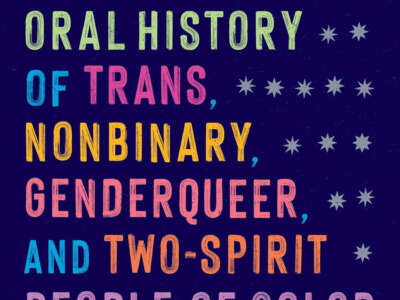Marsha P. Johnson has become an icon of gay, trans, and queer liberation, and yet little is known about her life beyond her participation in the Stonewall Uprising of 1969 and the decadeslong controversy after her lifeless body was found floating in the Hudson River in 1992. In Marsha: The Joy and Defiance of Marsha P. Johnson, Tourmaline, an award-winning Black trans artist, filmmaker, and activist who has dedicated her life to uplifting Marsha P. Johnson’s legacy, recuperates her life from the flatness of postmortem deification.
Here we find a fully embodied story of a 1950s New Jersey kid; a 1960s Times Square Hustler and den mother; a fiercely talented performer; and a dedicated activist and AIDS care worker whose unconventional way of thinking and being paved the way for generations of street queens and trans people. Her influence looms large, and Tourmaline is intent on presenting the full range of her choices, inspirations, limitations, and visionary imaginings for us to learn from today.
Mattilda Bernstein Sycamore: This is a biography of Marsha P. Johnson, but it’s also a story about friendship as a resource for trans survival, political engagement, personal transformation, and communal care. What role did friendship play in Marsha’s life, and how does looking at her life’s work through the lens of friendship enrich her legacy?
Uncompromised, uncompromising news
Get reliable, independent news and commentary delivered to your inbox every day.
Tourmaline: Friendship almost doesn’t feel like a big enough word for the depth and breadth of love Marsha offered to and received from her dear ones. We talk a lot in the queer community about “chosen family,” and the relationships that Marsha built in NewYork City starting when she moved to Manhattan in 1963 didn’t just shape her life, they shaped history. Marsha’s ability to be a beacon of power and joy was fueled by, nurtured in, and shaped among the community that she built with her fellow street queens, the wider queer community, and the bicoastal and transatlantic connections she made in a period of immense cultural change.
Two friendships really stand out to me in very different ways — Marsha’s relationship with Sylvia Rivera, and her relationship with Randy Wicker. Could you speak to the ways these relationships both challenged and enriched Marsha’s life, and the lives of Rivera and Wicker?
I feel so lucky to have been able to become friends with Randy myself over 15 years ago while archiving Marsha’s life. Then in the process of writing this book and my other work on Marsha’s legacy, including my film Happy Birthday, Marsha, Randy has been incredibly generous in sharing source material related to Marsha, as well as his own memories and reflections. They supported each other in so many ways, pushing each other to see the world more expansively and lovingly, and offering each other really concrete, material support too.
Of course, Marsha’s friendship with Sylvia was also an extraordinary source of mutual power and motivation. The two of them came together when Sylvia was just 13 years old, hustling in Times Square, and Marsha at times played a role of mother figure to the young street queens — offering guidance, love, and unconditional support that many had never had access to before. Together they engaged in what we might call, in the words of Robin D.G. Kelley, “freedom dreaming” — seeing through the challenge of their circumstances to a bigger, more beautiful world that they knew they could build together.
Marsha P. Johnson and Sylvia Rivera are now hailed as icons of gay, queer, and trans liberation, but when they were alive they were often dismissed and marginalized by the gay establishment. What realities does their postmortem deification hide, and what possibilities does it limit?
Authentic individual expression that disrupts binaries, coercive control, or the established flow of power is inherently threatening to the systems that be. Marsha, Sylvia, and other people who were committed to living authentically and deliberately demonstrated a new way of being that many people weren’t ready for — it felt destabilizing to see so much freedom in action. But Marsha actually didn’t focus very much of her time or energy on any kind of direct, oppositional conflict. There were occasions when it was a necessary result of her existence — for instance, at Stonewall — but I think often of her middle initial: P, which she said stood for “pay it no mind.” Her ability to look beyond, through, and even past daily circumstances of dismissal or marginalization was a huge source of strength and power allowing her to dream up the world she wanted and desired. She was too busy falling in love, making art, inspiring others, traveling, resting, relaxing, and honoring her own joy to pay any mind to attempts to make her smaller.
Stonewall has become romanticized as a place where everyone belonged, but you show how actually it was a Mafia-run, segregated gay bar where street queens were most often not even allowed inside. White gay men were in the front, and everyone else in the back — what does telling the actual story of this space where the Stonewall Uprising emerged help us to understand?
Nuance and complexity are hard to hold when our culture often operates in binaries. Stonewall was a hugely important community gathering place, and it was also reflective of all of the realities of its time. It was not a perfect utopia of total collective welcome; but what it was was a gathering place where people found their way towards each other, even across some of the limitations you described. And that moment of collective uprising in 1969 — even coming out of an imperfect hub for gathering and building community — might help us learn the power of broad-based coalitions for freedom and joy. Stonewall can teach us how strong we can be when we ignore what would keep us apart, and double down on our desire to be together, free from fear and shame.
You quote poet and disability justice author and activist Leah Lakshmi Piepzna-Samarasinha as saying that a riot is a “powerful place of madness.” So, if we want to reinvoke the spirit of Stonewall, should we be invoking madness?
Absolutely. Marsha was open with herself and others about the ways that trauma, violence, and her own unique humanity led her to perceive the world differently than others. Sylvia Rivera reflected on this quality in her friend too, and she observed that it was a huge source of freedom — Marsha had a different way of seeing the world, and it was one that invited and encouraged freedom and a wider lens.
By applying a disability justice lens to Marsha’s story, you’re able to show how her mental health challenges were also part of how she was able to imagine a different world, to conjure this in everyday experience, in spite of abuse from her mother, from people on the street, from the cops — talk more about what this enabled her to do.
Marsha looked beyond and through the harsh circumstances she endured. She saw the world as it could be, instead of narrowly as it was. She invested in a vision of the world that others found improbable or even impossible. Her belief in her own sight — and the spiritual fuel she found in her relationship with the divine — empowered her to bring her visions into reality over and over again.
You really bring STAR House, the trans youth shelter that operated briefly in lower Manhattan in 1970 and 1971, to life — this collective experiment in trans self-determination and communal care. They managed to do so much with so little resources. Now we have funded nonprofits that often do much less. Is there a lesson here?
Marsha’s relentless pursuit of her dreams was antithetical to the narrow understanding of logic that many of our institutions use today. Her logic was sound, but perhaps unfamiliar to many people. She knew that she could glimpse the world she wanted to live in in the midst of harsh circumstances that surrounded her. She knew that by leaning into her own vision, her faith, her love, and her joy, it was entirely possible to build the types of spaces she wanted to experience. For me, the book is the story of her and her community doing that over and over again.
You write that Marsha P. Johnson was “disinterested entirely in respectability and assimilation.” What can this teach us today?
In my two decades of researching, learning from, and diving into Marsha’s life story, I’ve learned over and over again that turning the volume up on what makes us feel authentically alive and joyful can be a powerful antidote to structures and systems that would try to reduce our power. Marsha taught us that being authentically and unapologetically yourself can be a guiding light that leads us closer to the world of freedom, ease, love, and joy that we deserve to live in.
Keep the press free. Fight political repression.
Truthout urgently appeals for your support. Under pressure from an array of McCarthyist anti-speech tactics, independent journalists at Truthout face new and mounting political repression.
We rely on your support to publish journalism from the frontlines of political movements. In fact, we’re almost entirely funded by readers like you. Please contribute a tax-deductible gift at this critical moment!
Read full article at source
Stay informed about this story by subscribing to our regular Newsletter

